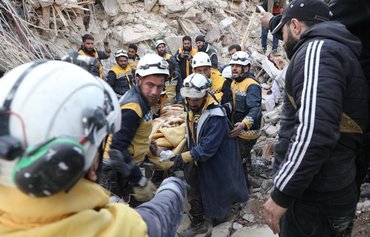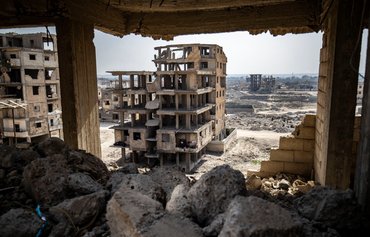Despite its claims to be a friend of the Syrian people, Russia has provided little in way of support to the Syrians living in the areas hit the hardest by the recent catastrophic earthquake.
This failure to step up points to Russia's self interest in Syria, activists and observers say, and also reveals that it is stretched too thin as a result of its assault on Ukraine to offer a meaningful level of assistance to the suffering Syrian people.
Some in Syria noted that many of their problems were brought about in the first place by Russia's support of the brutal regime of Bashar al-Assad.
When the earthquake struck, Russian forces and affiliated militias were stationed in the affected areas already, and could have provided immediate assistance.
![A member of the White Helmets consoles a Syrian child who lost his friends in the earthquake, on February 10. [White Helmets]](/cnmi_am/images/2023/03/06/40794-syria-white-helmets-600_384.jpg)
A member of the White Helmets consoles a Syrian child who lost his friends in the earthquake, on February 10. [White Helmets]
![Two exhausted members of the White Helmets take a break on February 10, four days after the 7.8-magnitude quake that hit parts of Syria and Türkiye. [White Helmets]](/cnmi_am/images/2023/03/06/40795-syria-quake-relief-600_384.jpg)
Two exhausted members of the White Helmets take a break on February 10, four days after the 7.8-magnitude quake that hit parts of Syria and Türkiye. [White Helmets]
But that was not a priority for Russian President Vladimir Putin, local activists said, with Moscow instead choosing to invest in more deadly weapons with which to continue its unprovoked assault on Ukraine.
The cost of just one medium- or long-range missile is roughly equivalent to the cost of securing the essential needs of dozens of Syrian families affected by the earthquake, they noted.
The 7.8-magnitude quake that struck neighbouring Türkiye killed more than 50,000 people, including almost 6,000 in Syria, AFP reported.
In Syria alone, at least 8.8 million people have been affected by the devastating quake, according to the United Nations.
Little Russian aid
"Instead of giving attention to the Syrian people and making efforts to support them during the ordeal brought on by the earthquake, Russia has proceeded to escalate its offensive in Ukraine," said Syrian economist Mahmoud Mustafa.
"Russia recently carried out its largest missile attack since the start of the war, on the Zaporizhzhia region," he told Al-Mashareq.
On February 10, Ukraine said Russia launched "massive" missile and drone attacks that targeted cities and critical infrastructure facilities in the Kharkiv region in the east and the southern Zaporizhzhia region.
"Moscow has not provided any actual assistance to Syria and has not taken any steps to improve the infrastructure to help the Syrian people," Mustafa said.
If Russia had mobilised its heavy machinery and a small portion of its army and affiliated militias in Syria in the first hours after the earthquake, it would have made a difference, Mustafa said.
This would have helped Syrians, especially as the regime did not fulfill its duties in this regard, he said.
"We have not not seen any food aid from the Russian army and its multinational militias to the people sleeping on the streets after losing their homes," he said.
Russia has not acted with humanity in Syria, Mustafa said, adding that in his opinion, Putin is disgracing his nation and its history with his actions.
Russian army's apathy
Residents of regime-controlled Latakia and Tartous provinces are angry at the Russian army's apathy after the earthquake crisis, Syrian activist Mohammed al-Beik told Al-Mashareq.
"These areas have been controlled by the Syrian army for decades," he said.
"People expected to receive assistance from the Russian bases immediately after the earthquake, but they were shocked to see their demands were ignored."
Only one group of Russian rescuers was dispatched to help the quake-stricken population, and that was on the third day after the earthquake, al-Beik said.
The Russians distributed only one truckload of food, which mostly consisted of flour and some canned foods, he said.
Survivors waited for hours, but only a few of them got some food, he added, while the rest were told to come back at a later time.
"It seemed as though all the Russians wanted was to take pictures during the distribution process to pretend that Russia cares about the Syrian people."
Resources diverted to Ukraine war
Russia does not have the resources to provide assistance to the Syrian people amid their current ordeal, as all of its resources have been diverted to the war on Ukraine, said political expert Abdul Nabi Bakkar.
Russia spends money in Syria, but the money is spent on air strikes on certain areas to preserve its control and the gains it has made over the past years, rather than on saving people and helping them, he said.
Since the beginning of its intervention in the Syrian war, Russia has not provided aid or money to Syrians, he added, pointing out that the only money it has spent in the country has gone to its militias' salaries.
Even these salaries are generally not paid by the Russian government, as they are often covered by Syrian businessmen and influential figures, Bakkar said.
The same applies to Russian mercenaries from the Wagner Group, he said, whose salaries are often paid by Syrians or the local residents of other countries where they are deployed in exchange for their "protection services".
Either way, he noted, the Russians profit, while the local residents pay.

![Volunteers and civilians in Latakia try to reach survivors using primitive tools on February 8, following a devastating earthquake. The Russians have a heavy presence in Latakia. [Syrian Arab Red Crescent]](/cnmi_am/images/2023/03/06/40792-syria-latakia-volunteers-600_384.jpg)






